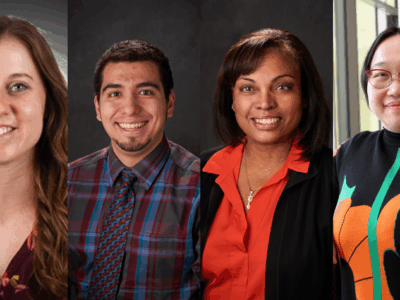1
December

Jason Kwan, assistant professor, Pharmaceutical Sciences Division, will serve as Principal Investigator, with Warren Rose, associate professor (CHS), Pharmacy Practice Division as Co-Investigator for a grant from the NIH-National Institute of Allergy and Infectious Diseases (NIAID) for the identification of evolved molecules that provide defense again infection in a natural system. The central hypothesis is that there are specific strategies that have evolved to fight bacterial infection in nature, that exert less selection pressure for antibiotic resistance. The proposed research will develop a generalizable “innovative research strategy” which uses insights in microbial ecology to identify evolved bioactive molecules.
Marine sponges will provide the system to test the hypothesis as they are simple invertebrates that rely on a complex assemblage of bacterial associates to produce small molecules that protect against predation and, perhaps, infection. As the majority of sponge symbionts are difficult to isolate and grow in the laboratory, culture-independent methods must be used, for example the direct sequencing of DNA derived from the sponge and bacterial community, a technique called metagenomics. The project will rely on bioinformatics methods developed by Dr. Kwan’s lab to extract individual bacterial genomes from sequencing data, and to track the expression of pathways that make small molecules in response to incoming sponge pathogens. Upregulated compounds may prevent colonization of the large internal surface area of the filter-feeding sponge by incoming bacteria, and these compounds will be screened for anti-biofilm activity. Biofilms are formed by bacteria associated with surfaces, and they are found in many clinical infections. As bacteria in biofilms are generally resistant to antibiotics, there is a need for effective treatments that target biofilms specifically.
Kwan’s research interests include the role of uncultured symbionts in natural product biosynthesis within marine invertebrates; marine natural products chemistry; drug discovery; next-generation sequencing; metagenomics; bioinformatics; biosynthesis. He joined the faculty at School of Pharmacy in 2013.
Rose’s translational research interests involve the pharmacodynamic effects of antimicrobials on antibacterial resistance development and virulence expression. His laboratory incorporates multiple in vitro modeling systems to simulate antimicrobial exposures against multi-drug resistant pathogens. These studies are used to evaluate optimal antibiotic activity, antibiotic penetration into simulated infections, the development of antibiotic resistance, and virulence. His clinical studies involve the impact of patient immune responses and bacterial virulence on the treatment outcome of invasive S. aureus infections. He joined the School of Pharmacy in 2007.
The NIH-NIAID conducts and supports basic and applied research to better understand, treat, and ultimately prevent infectious, immunologic, and allergic diseases.




